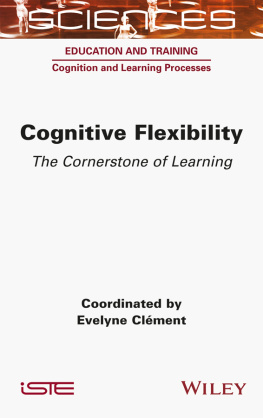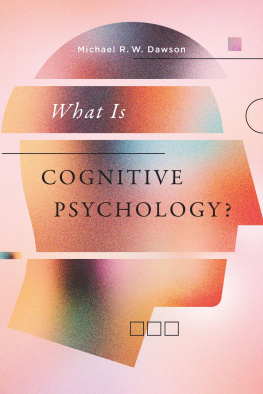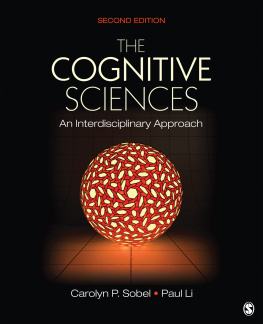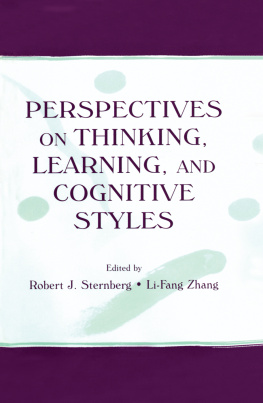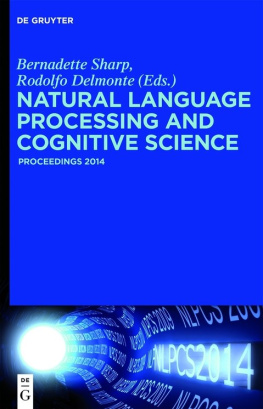
SCIENCES
Education and Training, Field Director Jean-Marc Labat
Cognition and Learning Processes, Subject Head Emmanuel Sander
Cognitive Flexibility
The Cornerstone of Learning
Coordinated by
Evelyne Clment

First published 2022 in Great Britain and the United States by ISTE Ltd and John Wiley & Sons, Inc.
Apart from any fair dealing for the purposes of research or private study, or criticism or review, as permitted under the Copyright, Designs and Patents Act 1988, this publication may only be reproduced, stored or transmitted, in any form or by any means, with the prior permission in writing of the publishers, or in the case of reprographic reproduction in accordance with the terms and licenses issued by the CLA. Enquiries concerning reproduction outside these terms should be sent to the publishers at the undermentioned address:
ISTE Ltd
27-37 St Georges Road
London SW19 4EU
UK
www.iste.co.uk
John Wiley & Sons, Inc.
111 River Street
Hoboken, NJ 07030
USA
www.wiley.com
ISTE Ltd 2022
The rights of Evelyne Clment to be identified as the author of this work have been asserted by her in accordance with the Copyright, Designs and Patents Act 1988.
Library of Congress Control Number: 2021946241
British Library Cataloguing-in-Publication Data
A CIP record for this book is available from the British Library
ISBN 978-1-78945-035-4
ERC code:
SH4 The Human Mind and Its Complexity
SH4_1 Cognitive basis of human development and education, developmental disorders; comparative cognition
SH4_6 Learning, memory; cognition in ageing
Introduction
Evelyne CLMENT
Paragraphe, CY Cergy Paris University, Gennevilliers, France
Over the past three decades, the study of the flexible nature of human cognition has been of growing interest to scientists and practitioners specializing in early childhood, neuropsychology and education. In many manifestations of human activity, an important issue is to understand the nature and development of cognitive flexibility and the processes and contexts that promote or inhibit its expression. This issue is crucial in the field of lifelong learning, and more particularly in the field of school learning.
As evidenced by the scientific literature in this field of research, and although different understandings of flexibility have been proposed with some defining it as a general and universal process independent of the contexts in which it is expressed, others, on the contrary, as a skill that develops at the same time as other abilities, such as conceptual and language development a broad consensus is emerging on the flexible nature of human cognition to adapt to novelty and unexpected events. In this sense, as a cornerstone of learning, cognitive flexibility allows us to adapt to a constantly changing environment, to discover solutions in new and/or unexpected situations, to transfer knowledge learned in one context to a new context, to select the relevant stimuli in the environment to achieve a goal, to switch our attention from one stimulus to another according to the constraints of the situation, to alternate between two possible forms of processing stimuli, and to change our representation of the goal we are pursuing.
In this way, the flexible character of human cognition enables conceptual development through a creative combination of concepts as well as new learning by modifying our knowledge and habits in order to adapt to the situations in which we evolve and which we have to face. Moreover, this specificity of human cognition allows for the activation and flexible communication of representations in a wide range of activities, whether it is, for example, understanding a metaphor, being moved when reading a poem, using an object in a non-usual function, solving a problem, inferring and understanding the meaning of a new word, or adapting to a new work environment.
Cognitive flexibility plays a key role in the development of thought, reasoning and the acquisition of new knowledge, but also in the mediation of social interactions, the sharing of points of view and the elaboration of socially coordinated action plans. In short, its involvement is fundamental in accommodating the environment in which we evolve and in adapting to the predictable or unpredictable circumstances we encounter.
This collective work, written by French specialists in the field, presents the state of the art of current research in cognitive, educational and developmental psychology on cognitive flexibility. The book addresses current and topical questions concerning the measures of cognitive flexibility, the development of this skill in young children, its links with the development of metacognition and critical thinking, its implication in solution discovery, transfer of learning, evocation and matching between analogous situations, as well as the context and content effects that can impact our reasoning and their flexible expression in school learning situations.
(Clia Maintenant and Galle Bodi) reviews the different tools available to the clinician psychologist and/or researcher to evaluate this process. The authors present the so-called direct methods, which involve an evaluation of flexibility capacities by means of a concrete situation (a task constructed in the laboratory or a more ecological situation), and the so-called indirect methods, which use questionnaires and are the most commonly used in neuropsychological assessments of patients with executive dysfunction or of very young children.
(Agns Blaye) presents several developmental studies conducted with young children in which cognitive flexibility is understood as one of the manifestations of controlled and goal-directed cognitive functioning. Through various experiments focused on inflexible behaviors exhibited by very young children, this chapter empirically demonstrates that changing representations, or in other words being flexible, requires updating and then maintaining the new goals implied by the constraints of situations.
(Valrie Pennequin) questions the links between executive functions and metacognition, and more specifically between cognitive flexibility and metacognition. After presenting definitions and parallel research on metacognition and executive functions, this chapter highlights the conceptual commonalities between these notions and presents empirical results on the complex links between them.
(Calliste Scheibling-Sve, Elena Pasquinelli and Emmanuel Sander) deals with one of the major objectives advocated in educational policies, which is the education of critical thinking. Comparing philosophical and psychological approaches to this notion, whose definition does not have a consensus, the chapter deals with the cognitive mechanisms underlying critical thinking such as the change in point of view, metacognition or the recategorization of situations. A path for critical thinking education through the process of multiple categorization is proposed.
(Evelyne Clment) deals with the crucial role of flexibility in problem solving. Focusing on the different factors involved in successful solution discovery, this chapter presents the results of empirical research conducted in education and cognitive psychology as well as recent work on the links between flexibility, creativity and academic performance. The benefit and implications of research on the development of educational programs to stimulate flexibility and creative thinking are discussed.
Next page
